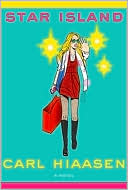But Beautiful: A Book about Jazz
"May be the best book ever written about jazz."—David Thomson, Los Angeles Times In eight poetically charged vignettes, Geoff Dyer skillfully evokes the music and the men who shaped modern jazz. Drawing on photos, anecdotes, and, most important, the way he hears the music, Dyer imaginatively reconstructs scenes from the embattled lives of some of the greats: Lester Young fading away in a hotel room; Charles Mingus storming down the streets of New York on a too-small bicycle; Thelonious Monk...
Search in google:
In eight poetically charged vignettes, Geoff Dyer skillfully evokes the music and the men who shaped modern jazz. Drawing on photos, anecdotes, and, most important, the way he hears the music, Dyer imaginatively reconstructs scenes from the embattled lives of some of the greats: Lester Young fading away in a hotel room; Charles Mingus storming down the streets of New York on a too-small bicycle; Thelonius Monk creating his own private language on the piano. However, music is the driving force of But Beautiful, and Dyer brings it to life in luminescent and wildly metaphoric prose that mirrors the quirks, eccentricity, and brilliance of each musician’s style.James MarcusIn But Beautiful, Geoff Dyer memorializes such jazz giants as Lester Young, Charles Mingus, and Thelonious Monk. These aren't, however, your customary thumbnail sketches. Practicing what he calls "imaginative criticism," Dyer embroiders the historical record with invented dialogue and action, stitching together these materials with his own verbal improvisations. My first reaction was to recoil in horror. Surely the unadorned facts of, say, Duke Ellington's life are significant enough on their own, and don't require a young British novelist to inflate them with poetic ether. As it turns out, Dyer's book does contain a few moments of squishy sentimentality, the worst of them being his up-close-and-personal communion with the ghost of pianist Bud Powell. But for the most part, his writing is evocative, eloquent and, well, beautiful. What's more, his poetic language is always deployed in the service of accuracy. Anybody who has ever listened closely to Monk's music, for example, will recognize Dyer's account of his idiosyncratic style: "He played each note as though astonished by the previous one, as though every touch of his fingers on the keyboard was correcting an error and this touch in turn became an error to be corrected and so the tune never quite ended up the way it was meant to." In the end, But Beautiful is a splendid meditation on jazz and the personalities that created it, couched in a prose as lyrical -- and as rigorous -- as the music it describes. -- Salon
\ From the Publisher"Achingly gorgeous . . . evokes the lives of working musicians so that you taste the whiskey, smell the stubbed cigarettes, hear the gentle clicking of the valves, the coughs, and shuffling feet between studio takes."—Jonathan Lethem, Entertainment Weekly "The only book about jazz that I have recommended to my friends. It is a little gem."—Keith Jarrett "A masterful effort, which comes as close to the music's essence as prose can go."—Ted Gioia, San Francisco Chronicle "Dyer turns jazz into poetry and his subjects into a beautiful sad music....Few will be unmoved by his passion and eloquence and the harrowing portraits of jazz's haunted geniuses."—Tom Graves, The Washington Post Book World "A gorgeous and lyrical collection of nocturnal jazz reveries."—The New Yorker\ "But Beautiful is just that, a moving and highly original tribute to Black American music."—Bryan Ferry\ "An ingenious and brilliantly written book."—Richard Bernstein, The New York Times\ "Startlingly vivid . . . a brilliant work . . . the written equivalent of a jazz performance . . . [Dyer] has created an unforgettable melody of his own."—Matt Schudel, The Atlanta Journal Constitution\ \ \ \ \ \ James MarcusIn But Beautiful, Geoff Dyer memorializes such jazz giants as Lester Young, Charles Mingus, and Thelonious Monk. These aren't, however, your customary thumbnail sketches. Practicing what he calls "imaginative criticism," Dyer embroiders the historical record with invented dialogue and action, stitching together these materials with his own verbal improvisations. My first reaction was to recoil in horror. Surely the unadorned facts of, say, Duke Ellington's life are significant enough on their own, and don't require a young British novelist to inflate them with poetic ether. As it turns out, Dyer's book does contain a few moments of squishy sentimentality, the worst of them being his up-close-and-personal communion with the ghost of pianist Bud Powell. But for the most part, his writing is evocative, eloquent and, well, beautiful. What's more, his poetic language is always deployed in the service of accuracy. Anybody who has ever listened closely to Monk's music, for example, will recognize Dyer's account of his idiosyncratic style: "He played each note as though astonished by the previous one, as though every touch of his fingers on the keyboard was correcting an error and this touch in turn became an error to be corrected and so the tune never quite ended up the way it was meant to." In the end, But Beautiful is a splendid meditation on jazz and the personalities that created it, couched in a prose as lyrical -- and as rigorous -- as the music it describes. -- Salon\ \ \ Publishers Weekly\ - Publisher's Weekly\ Dyer (Ways of Telling) here weaves impressionistic fantasies around the lives of eight jazz legends. Though he calls this "imaginative criticism,'' the vignettes, inspired by photos and writings about the artists, have little to do with music. Rather, he muses about the musicians' personalities and certain episodes in their lives-Lester Young's disastrous stint in the army, Thelonious Monk's inability to communicate with anyone but his wife, Bud Powell's mental breakdown, Chet Baker's drug-induced deterioration, Duke Ellington's endless travels. The colorful essays are sometimes excessively fanciful, and they capture the atmosphere of alienation that surrounded these men who, often wasted by drug and alcohol abuse and worn out from days and nights on the road, seemed to function only when making music. The pretentious "afterword'' is irrelevant. Photos not seen by PW. (Jan.)\ \ \ \ \ Library JournalI was uneasy as I read in Dyer's preface that he invented dialog and action to produce a type of "imaginative criticism." But I soon found myself immersed in a series of atmospheric vignettes populated by several troubled geniuses of the bebop era. The fictive device allows us to experience the pain and loneliness that led many of these artists to drink, drugs, and madness. Whether we are witnessing Lester Young's humiliation by a sadistic agent, seeing Thelonious Monk lose his cabaret card in a bad bust, or watching Chet Baker getting his teeth bashed in by an unpaid drug dealer, we move through each scene in a type of bleary-eyed disorientation that might follow a late night of jazz, booze, and despair. Dyer evokes the rhythm and feeling of the music as his words echo the forlorn, aching sound of a midnight solo. An essential purchase for all jazz collections.-Dan Bogey, Clearfield Cty. P.L. Federation, Curwensville, Pa.\ \ \ \ \ Ted Gioia"A masterful effort, which comes as close to the music's essence as prose can go."— Ted Gioia, San Francisco Sunday Examiner and Chronicle\ \ \ \ \ Tom Graves"Dyer turns jazz into poetry and his subjects into a beautiful sad music... Few will be unmoved by his passion and eloquence."— Tom Graves, The Washington Post\ \ \ \ \ The New Yorker"A gorgeous and lyrical collection of nocturnal jazz reveries, in which Dyer uses history, photographs, and recordings the way his famous subjects use musical themes-as a starting point for creative embellishment and improvisation."\ \ \ \ \ Keith Jarrett"But Beautiful is the only book about jazz that I have recommended to my friends. It is a little gem, with the distinction of being 'about' jazz rather than 'on' jazz. If closeness to the material determines a great solo, Mr. Dyer's book is one."\ \ \ \ \ Ralph Blumenthal"You don't have to be a jazz buff to savor this book-but you may be one when you're done."— Ralph Blumenthal, The New York Times Book Review\ \








